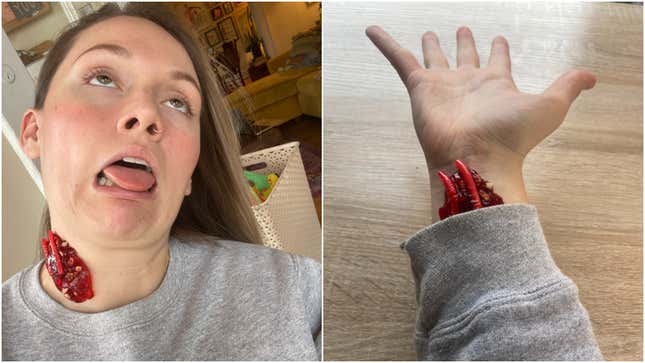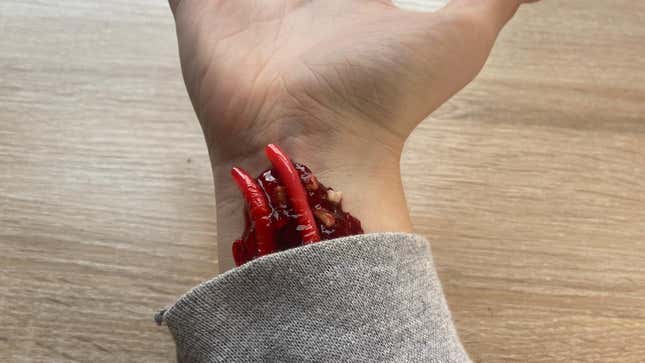
Welcome, foolish mortals, to the home of cadaverous casseroles, exsanguinous eats, and snack-related sagas so strange and frightening they may well transport you to a realm unknown. Welcome, readers, to A Dark and Stormy Bite, a monthly column (weekly, through October!) that dives deep into a teeth-chattering culinary dimension of utterly ghoulish proportions. Basically, if it involves food and goes bump in the night, we’ll cover it here. Do you have a favorite haunted restaurant or cursed recipe? Email lstone@thetakeout.com—and beware.
Hello, creepy freaks and scary geeks. It’s Halloween weekend, which means it’s our time to shine. My weekend plans involve a brisk autumnal stroll, a screening of Possession, and gut-busting quantities of sour candy. If that sounds tame, it’s only because I’ve been celebrating Halloween all month long with a nonstop stream of horror flicks—most notably, George Romero’s 1985 zombie flick, Day of the Dead.
Day of the Dead is an all-time gory fave thanks to its stomach-gurgling horror prosthetics, like the ones in this iconic throat-eating scene in which a man gets his throat viscera torn out, cheese pull-style. The scene is gross and icky and very cool to watch, but my recent viewing did lead me to ask: how’d that prosthetic throat taste?
Think of it this way: The film came out more than three decades ago, pre-CGI, and it’s tough to know exactly what those zombie actors were putting in their mouths. Looking to the history of horror prosthetics, they haven’t always prioritized flavor. True, Hitchcock famously favored watered-down Hershey’s chocolate syrup to mimic fake blood; however, films like Stanley Kubrick’s The Shining went with a more viscous, less chocolatey variation involving corn syrup and food dye.
If I had to guess, I’d assume that the Day of the Dead zombie actors were faced with some sort of gummy, stretchy, dyed cornstarch situation with a non-toxic binding agent. If that’s the case, it probably tasted like absolute garbage. With this in mind, I decided to see if there are any palatable horror prosthetics out there on the market. I started by browsing the huge gory prosthetic section on Etsy. The products were impressive, ranging from “realistic bite wound (human)“ to “exposed throat” and even “large skin disease.” But none of the Etsy listings looked even a little bit snackable. Where are the umami wounds, Etsy?!
Left with no other option, I decided to make my own pleasantly flavored horror prosthetics. They needed to be red, gushy, and preferably fruit-flavored. It was then that I realized one of my favorite desserts looked awfully like a wound: strawberry-pretzel salad.
When you think about it, each of the three layers within a strawberry-pretzel salad look like components of a gnarly wound. The crushed pretzel crust is undeniably scabby; the cream cheese filling is delightfully reminiscent of pus; finally, the strawberry Jell-O top layer screams “blood and ooze.” I asked myself: could I make a peel-and-stick wound that tasted vaguely like strawberry-pretzel salad?
Crafting the wound
I wasn’t sure how to start, but I knew my wounds needed to be gelatin-based. Properly-prepared gelatin is springy, a bit sticky, and buildable in a way that would allow me to create some three-dimensional viscera.

I initially tried to make the wounds strictly out of raspberry Jell-O, thinking it would shape up better than plain, unflavored gelatin. Unfortunately, the Jell-O didn’t set up properly even after four hours of chill time. The result was too runny and sticky to use as a prosthetic.
Next, I tried a batch with a plain gelatin base flavored with bright red Crystal Lite powder. Using a slow, layered approach, I was able to build something truly grotesque (pictured left). Did my final wound taste amazing? No, but it tasted fine—sort of like a low-tier fruit snack. Ultimately, these edible wounds are nontoxic, cheap to make, and highly customizable depending on your preferred level of scabbing. (I really leaned into the scabs, created using chopped pecans.)
Edible peel-and-stick gelatin wounds
- 1 packet clear, unflavored gelatin
- 1–2 packets red Crystal Lite powder (I went with raspberry, but you could use any red flavor. Kool-Aid powder would also work here.)
- 1–2 sheets plastic wrap
- Crushed pecans
- Peel-apart Twizzlers or Red Vines
- Anything else you’d like to use to adorn your wound (tea leaves, oatmeal, marshmallow fluff, etc.)
Prepare your work area, taping down a few sheets of plastic wrap.
Prepare the gelatin according to the packet directions. Let the warm gelatin sit for about a minute before spooning half of it onto the plastic wrap to form wound-size ovals. These ovals will serve as the base of your wounds, so make them as large or small as you like. One packet of gelatin should produce 4–5 wounds, each about the size of a large egg.
Let the first layer of gelatin firm up a bit, resting for around 10 minutes. Once it’s sticky and relatively firm, sprinkle your red Crystal Lite powder onto the wound. You don’t want to sprinkle it evenly—the granules make for fun texture, so go nuts—just make sure the entire surface of the gelatin is covered.
Let that layer rest for a few more minutes before adding another layer of gelatin to each wound. Keep adding layers of gelatin and Crystal Lite, taking your time to ensure each layer has time to firm up before adding another.
Add nuts, Red Vines, and other wound adornments to each layer as you see fit to mimic scabs, veins, and flesh patches. Get nasty with it.
Cover each wound with plastic wrap, and stick them in the fridge overnight. After around eight hours, they should be firm, flexible, and sticky. If you’d like to stick them to your skin as part of a costume, you can use an edible adhesive like this one from Wilton. However, I recommend placing them gently on your neck, wrists, and/or butt and terrifying your loved ones by screaming, “A zombie ate my neck, wrists, and/or butt!” Once they’ve recovered from the initial shock, offer them a tasty scab.